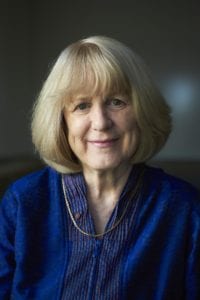Published: Monday, July 13, 2020, 12:00 p.m. U.S. Eastern Time
Media Contact: Kara Flynn, 301.634.8424 press@ashg.org

(courtesy Dr. King)
ROCKVILLE, MD – The American Society of Human Genetics (ASHG) has named Mary-Claire King, PhD, American Cancer Society Professor of Medicine and Genome Sciences at the University of Washington, as the 2020 recipient of the annual William Allan Award.
The William Allan Award, which carries a $25,000 prize, recognizes substantial and far-reaching scientific contributions to human genetics, and was established in 1961 in memory of William Allan, MD (1881-1943), one of the first American physicians to conduct extensive research on human genetics and hereditary diseases.
“In recognizing the most outstanding science in human genetics and genomics, it is a great honor to present Dr. Mary Claire King with the 2020 William Allan Award,” said ASHG President Anthony Wynshaw-Boris. “She has made seminal contributions to her field, provided groundbreaking insight into the existence of the gene she named BRCA1, and changed our understanding of cancer prevention and treatment.”
Dr. King has worked in areas of human genetics ranging from inherited predisposition to cancer to mental illness to evolution to human rights. “She has an outstanding record of accomplishment over the last 48 years—from her first papers as a graduate student to her latest papers investigating the genetic etiology of breast cancer and schizophrenia. Her research has both challenged existing paradigms and, in many cases, significantly influenced the course of human genetics research,” said Evan Eichler, PhD, an investigator at Howard Hughes Medical Institute and Professor of Genome Sciences at the University of Washington School of Medicine, in his nomination letter.
“It is impossible to overestimate the contributions of Dr. Mary-Claire King,” said ASHG President-Elect, Dr. Gail Jarvik, Head and Professor, Division of Medical Genetics, the Arno G. Motulsky Endowed Chair in Medicine Joint Professor of Medicine and Genome Sciences, and Adjunct Professor of Epidemiology. “In addition to making major contributions in evolutionary genetics, human disease genetics, and forensic genetics, her work has been a model for successful international and cross-cultural collaboration. She has been and remains a remarkable role model.”
Dr. King studies complex, heterogeneous human conditions that are influenced by both genes and environment. As a graduate student, she demonstrated that the protein coding genes of humans and chimpanzees are 99% genetically identical. As an independent scientist beginning in the 1970s, she proved the existence of the gene she named BRCA1, which harbors mutations with a major influence on the risk of breast and ovarian cancer in hundreds of thousands of women. That discovery led to fundamental changes in cancer prevention and treatment. She developed and deployed genomic sequencing to identify victims of human rights abuses. Her studies of de novo mutations in persons with schizophrenia changed the paradigm for understanding causes of that mental illness. She established international partnerships on five continents to identify the genetic causes of severe disorders in children.
“She is a role model not only to other scientists but to hundreds of students and trainees with whom she has interacted over the years. Recognition of her productivity, excellence, and unparalleled contribution to our field with the William Allan Award is long overdue,” Dr. Eichler said.
Although ASHG has made the decision to host the Society’s annual meeting virtually, the exact timing of the William Allan Award Presentation is not yet known. An update will be provided as soon as information is available.
About the American Society of Human Genetics (ASHG)
Founded in 1948, the American Society of Human Genetics is the primary professional membership organization for human genetics specialists worldwide. Its nearly 8,000 members include researchers, academicians, clinicians, laboratory practice professionals, genetic counselors, nurses, and others with an interest in human genetics. The Society serves scientists, health professionals, and the public by providing forums to: (1) share research results through the ASHG Annual Meeting and in The American Journal of Human Genetics; (2) advance genetic research by advocating for research support; (3) educate current and future genetics professionals, health care providers, advocates, policymakers, educators, students, and the public about all aspects of human genetics; and (4) promote genetic services and support responsible social and scientific policies. For more information, visit: http://new.ashg.org.
6120 Executive Blvd, Suite 500 | Rockville, MD 20852 | 301.634.7300 | society@ashg.org | new.ashg.org
Connect with ASHG on Twitter (@GeneticsSociety) | Facebook | LinkedIn
